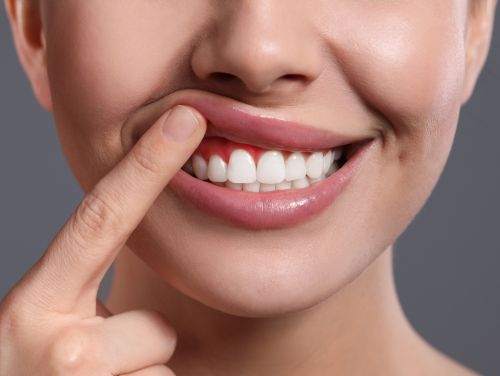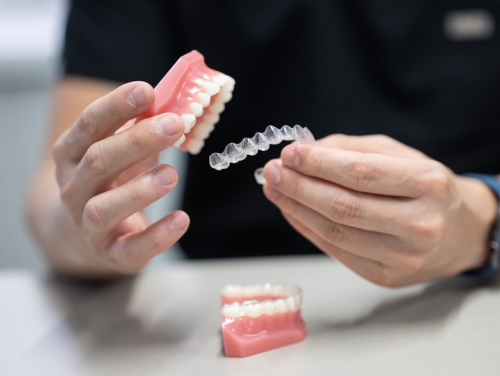What Can Stress Do to Your Body? 10 Weird Effects

Tension headaches. Heart racing a mile a minute. Muscle tightness.
You’ve probably experienced these common side effects of stress on your body before. After all, stress is a natural part of life — and it’s completely normal to feel stressed from time to time.
However, severe or chronic stress can be seriously detrimental to your short- and long-term health. And it can also have some pretty unusual and unexpected impacts on different parts of your body.
Let’s take a look at 10 weird ways stress can affect your body.
But first, a disclaimer: Any information provided in this article is general only and should not be used to diagnose or treat the effects of severe or chronic stress. If you’re experiencing any of these effects of stress on your body, it is recommended that you book an appointment with your doctor or medical professional for further assessment and personalised advice.

Problems With Your Skin
Your body’s stress response triggers the release of certain hormones which cause blood to flow away from the skin and towards other organs and muscles. Chronic stress also deprives your skin of oxygen and essential nutrients. The impact of chronic stress on skin health can include acne, eczema, psoriasis, dehydration, inflammation, skin aging, hyperpigmentation and dullness.
Dealing with skin issues is never fun. And it can come as a serious blow to your confidence in your appearance and yourself. If you think stress may be the reason behind your skin concerns, book in to see your doctor or dermatologist. They will be able to assess your skin and determine the best approach to get you glowing again.

Issues With Your Mouth and Teeth
Did you know stress can also hurt your oral health? One of the most common effects of stress on the teeth and mouth is teeth grinding and clenching — also known as bruxism. If you have bruxism, you may clench or grind your teeth while you sleep or clench your teeth during the day without even realising. Bruxism can result in permanent damage to your teeth as it wears down enamel and can cause chipped or cracked teeth. It can also lead to other serious problems like temporomandibular joint disorder (TJD). If stress is causing you to clench or grind your teeth, talk to your dentist. They will recommend the best options to help you protect your teeth and curb your grinding, such as wearing a night guard or using Invisalign to correct your bite and properly align your teeth.

If stress is causing you to clench or grind your teeth, talk to your dentist. They will recommend the best options to help you protect your teeth.
Since stress impairs your immune system, you may also be at an increased risk of infections in your mouth like gum disease. If you notice any of the common signs of gum disease like bleeding and swollen gums or bad breath, book in to see your dentist ASAP who will be able to treat the infection and prevent further damage.

Digestive Troubles
Your brain and your gut share a special connection — called the gut-brain axis — and they’re *always* communicating with each other. This is why psychological and emotional stress can trigger digestive issues such as an upset stomach, diarrhea, constipation, bloating or flatulence. Not only can stress cause spasms in your gut, but it can also alter your gut microbiome (that is, the trillions of bacteria and other microbes that live in your gut and keep you healthy) and increase colonic inflammation.
Chronic stress may also see you rushing to the loo to urinate more frequently. This is because stress puts your body into a tense, adrenaline-filled ‘fight-or-flight’ mode which can increase the kidney’s production of urine and stimulate your bladder muscles. One way to try and combat the call of nature during times of stress is to do deep breathing or meditation exercises to relax your mind and your muscles.

Ringing In The Ears
Another strange effect of stress on the body is persistent ringing, buzzing, whooshing or chirping sounds in your ears. This annoying noise is known as tinnitus. But it doesn’t necessarily indicate that there’s something wrong with your ears — for most people, this condition happens exclusively within the brain. Tinnitus stems from misfiring neurons in the auditory cortex of the brain which leads you to hear a sound that isn’t actually there.
Unfortunately, stress can actually bring on or worsen tinnitus. This is because the part of your brain that reacts to stress and emotion, known as the amygdala, also helps to process sound. Stress is also the trigger for the tinnitus reactivity loop — where you hear the tinnitus then experience an emotional or stress response to the sound, which heightens your awareness of the sound, causing your stress response to grow stronger. If you’re experiencing tinnitus or any persistent noises in your ears, it is recommended that you see a medical professional for proper diagnosis and personalised advice on managing your condition.

Lump In The Throat
We’ve all been there. When emotions are running high and you’re overwhelmed with stress, it can feel like you have a big lump in your throat. This ‘lump’ may even make you feel like you’re struggling to swallow. The good news is that there’s nothing physically there. The weird lump you feel is called the globus sensation and it’s simply the muscles in your throat tightening due to your body’s stress response. There are few easy things you can do to try and ease this sensation, such as drinking water or throat exercises to relax the muscles.

Heightened Sense Of Smell
You know how a familiar smell — like your mother’s perfume or a whiff of hot chocolate — can bring back memories? This is because the parts of your brain that deal with smell and emotion are closely linked. In times of emotional stress, the increase in cortisol flooding through your system can heighten your sense of smell and improve your ability to identify odours. Weird, right? It’s believed that this occurs because your body’s stress response is designed to put you into a hyper-alert state and trigger the brain to “sniff out” potential threats.

Changes In Body Temperature
Sweaty palms and stress seem to go hand-in-hand (‘scuse the pun). When you’re feeling nervous or anxious, it’s normal to get a little more sweaty than usual. But chronic stress can cause you to sweat excessively. This is because the ‘fight-or-flight’ stress response triggers a huge rush of cortisol, adrenaline and other stress hormones, while also heightening the sympathetic nervous system, resulting in increased perspiration.
Stress can also leave you feeling a little hot under the collar — literally. Your body releases hormones that send blood to the muscles and increase circulation which raises your body temperature and can even bring on hot flashes.

Decreased Immune Response
Chronic stress is not only bad for your mental health, it’s also been shown to weaken the immune system and leave you at risk of getting sick more often. When you’re stressed, your body enters ‘fight-or-flight’ mode, ready to react to any perceived threat. With chronic stress, your body is constantly in this hyper-alert state. This means that if you’re exposed to an infection or virus, your body’s resources are already stretched to the limit and you may not be able to fight off sickness as you normally would. It has also been found that the stress hormone, cortisol, lowers the number of white blood cells that help the body fight off illness.

Impacts On Fertility
Stress affects the body in many ways, from your sleep to your overall health and wellbeing. So, it may come as no surprise that stress can also have an adverse impact on fertility in both women and men. One study in 2014 found that women with the highest stress levels were significantly more likely to experience infertility than others. This is likely due to the impact that stress can have on a woman’s menstrual cycle, including decreased ovulation and irregular periods. And men bear the brunt too — severe or chronic stress can interfere with the hormones needed to produce sperm, leading to a lower sperm count.
If you’re concerned about the impact of stress on your fertility, it’s important that you talk to your doctor. They will be able to assess your overall and reproductive health and determine the right course of action for you.

Women with the high stress levels are significantly more likely to experience infertility than others.

Delayed Wound Healing
Another unusual effect of stress on the body is the delayed healing of wounds, such as cuts, scrapes and bruises. When you’re stressed, the body produces an overabundance of cortisol. This disrupts the production and delivery of anti-inflammatory substances (called cytokines) which are designed to aid the healing process. This means that if you injure yourself, the wounds remain inflamed for longer and are much slower to heal.
To add further salt to the wound (again – pardon the pun!), you may also experience more pain than usual if you injure yourself since stress increases your pain sensitivity. This is due to the stress response creating an imbalance in your central nervous system pain modulation and sensitisation of nerve endings.
What to Do When You’re Feeling the Effects of Stress on Your Body
If you find yourself feeling more stressed or tense than usual, it’s important to check in with your body and pay attention to anything that doesn’t feel quite right. Stress can manifest itself in unusual ways in the body and can have some serious effects on your health if not managed effectively.
If you’re experiencing any of the classic or more unexpected effects of stress, be sure to make an appointment with your doctor. While you may be nervous or even embarrassed to open up about your stress, it’s important that you set aside any anxieties you have about seeing your doctor and discuss how you’re feeling. They will help you better understand and manage your stress so you can feel happier, healthier and more in control.
New Patient Guide & Price List

Get All the Information You Need on Pricing, Health Funds and the Application Process for Our Flexible Payment Plans.
- Price List
- Health Funds
- New Patient Form
- Dental Payment Plan Options
AFFORDABLE AND FLEXIBLE
Payment Plans Available
Here at Delight Dental Spa, we offer flexible payment plans, ensuring premium dental care remains within reach. We strive to help you smile brighter, faster.

The content has been made available for informational and educational purposes only. Delight Dental Spa does not make any representation or warranties with respect to the accuracy, applicability, fitness, or completeness of the content.
The content is not intended to be a substitute for professional personal diagnosis or treatment. Always seek the advice of your dentist or another qualified health provider with any questions you may have regarding a dental or medical condition. Never disregard professional advice or delay seeking it because of something you have read or seen on the Site.
DENTAL TREATMENTS
Services We Mentioned:
EXPLORE MORE


















